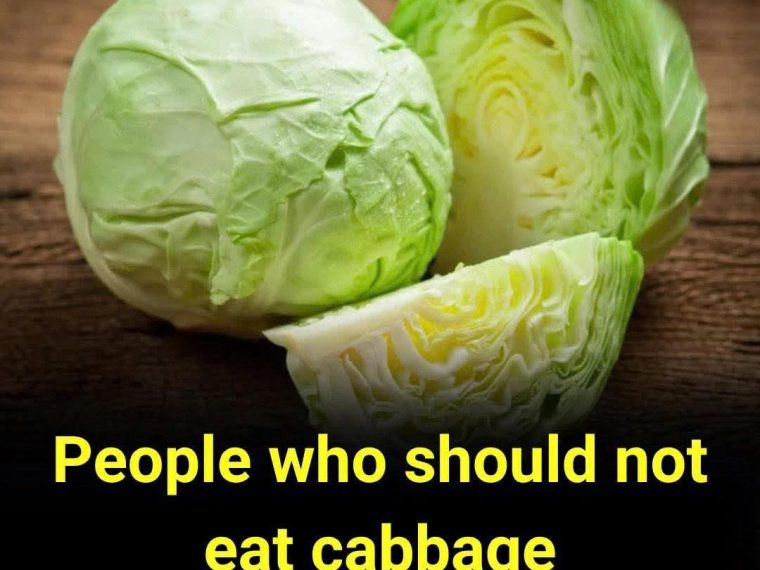🥬 People Who Should Not Eat Cabbage — Important Health Warning
Cabbage is one of the healthiest vegetables around. It’s low in calories, high in fiber, and packed with vitamins C and K. From salads and soups to fermented dishes like sauerkraut and kimchi, it’s a true nutritional powerhouse.
However, as healthy as it is, cabbage isn’t for everyone.
For some people, eating cabbage — especially in large amounts — can cause serious digestive or medical issues. Doctors and nutritionists advise certain individuals to limit or completely avoid cabbage depending on their health conditions.
Let’s take a look at who should be careful and why 👇
⚠️ 1. People With Thyroid Problems (Hypothyroidism)
Cabbage contains goitrogens, natural compounds that can interfere with the production of thyroid hormones.
When consumed in excess — especially raw cabbage — these goitrogens can slow down thyroid function and may worsen hypothyroidism.
What to do instead:
- Limit raw cabbage intake if you have thyroid issues.
- Cooking or steaming cabbage reduces most of its goitrogenic effect.
- Consult your doctor before including large amounts in your diet.
💨 2. People With Digestive Disorders or Gas Problems
Cabbage is high in fiber and raffinose, a natural sugar that’s hard for some people to digest. This can lead to:
- Bloating
- Gas and cramping
- Abdominal discomfort
If you have Irritable Bowel Syndrome (IBS), colitis, or a sensitive stomach, raw or fermented cabbage (like sauerkraut) may worsen symptoms.
What to do instead:
- Eat small portions and see how your body reacts.
- Opt for well-cooked cabbage, which is easier to digest.
- Avoid pairing cabbage with other gas-forming foods like beans or onions.
🩸 3. People Taking Blood-Thinning Medications
Cabbage is extremely rich in vitamin K, which plays a key role in blood clotting.
If you’re taking anticoagulants such as warfarin (Coumadin), eating large amounts of cabbage can interfere with your medication and make it less effective.
What to do instead:
- Maintain a consistent intake of vitamin K–rich foods.
- Don’t suddenly increase or decrease cabbage consumption without consulting your doctor.
💧 4. People With Kidney Stones
Cabbage contains oxalates, compounds that can contribute to the formation of kidney stones in people who are predisposed.
Although its oxalate level is moderate, regular heavy consumption can increase the risk, especially if you already have a history of stones.
What to do instead:
- Limit your intake if you’re prone to kidney stones.
- Drink plenty of water to help flush out excess oxalates.
🤰 5. Pregnant or Breastfeeding Women (In Excess)
While cabbage is safe in moderate amounts, excessive intake — particularly fermented cabbage — can cause gas, bloating, or digestive discomfort that may be passed on to the baby through breast milk.
What to do instead:
- Eat in moderation.
- Avoid raw or fermented cabbage if it causes discomfort.
🧫 6. People With Certain Food Sensitivities
Cabbage is part of the cruciferous family (along with broccoli, kale, and cauliflower).
Some people are sensitive to sulfur compounds in these vegetables, which can cause:
- Nausea
- Heartburn
- Flatulence or indigestion
If you experience these symptoms after eating cabbage, consider limiting it or trying cooked versions.
🌿 How to Enjoy Cabbage Safely
If you’re not in one of the risk groups above, cabbage can still be a fantastic addition to your diet. To minimize side effects:
✅ Cook it properly — steaming or boiling helps deactivate goitrogens and soften fibers.
✅ Eat smaller portions — don’t overload your stomach with raw cabbage.
✅ Balance it out — pair with easily digestible foods like rice or carrots.
🩺 Final Thoughts
Cabbage is incredibly healthy — but like all foods, it isn’t perfect for everyone.
If you have thyroid disease, digestive issues, blood-thinning medication, or kidney problems, it’s wise to consult your doctor before making cabbage a daily habit.
🥬 Remember: even healthy foods can cause harm when they don’t fit your body’s needs. Listen to your body and eat smart!





